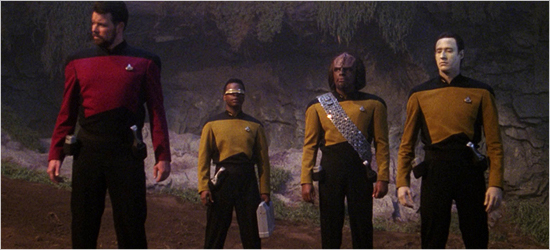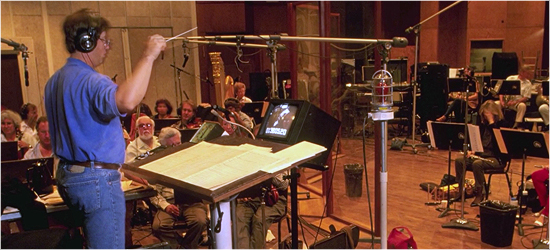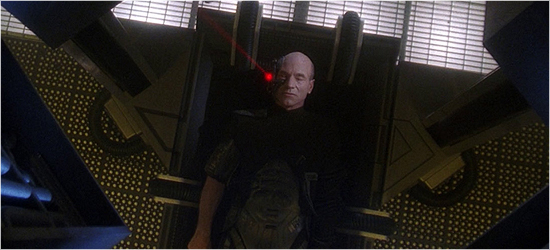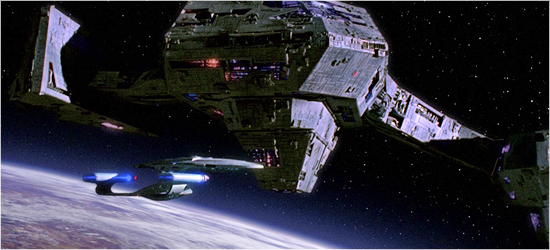Dissecting the Power and Impact of
One of Star Trek’s Most Influential Episodes
by Rob Heyman for TrekCore.com
![]()
Twenty-four years ago this month, a grueling summer-long wait was about to come to end. Fans of Star Trek: The Next Generation were about the find out if Picard — captured and transformed by the Borg in the thrilling two-part episode “The Best of Both Worlds” — was going to be destroyed by the Enterprise.
For those of us around at the time who watched “The Best of Both Worlds” on television (and saved it for endless rewatching on VHS), the season premier on September 24, 1990, could not come fast enough.

Part One of “The Best of Both Worlds” is widely celebrated as the one of the best episodes of Star Trek – at the very least, the best of The Next Generation. But what is it about this episode that made it so memorable among fans and a noted achievement among critics. It even seemed like The Next Generation itself could not escape the long shadow of this episode in the years that followed, never quite able to deliver another Borg episode — or another cliffhanger for that matter — with the same fresh spirit and adrenaline.
In retrospect, the success of the Borg finale for Season Three can be attributed to good timing, a writing and production staff hitting its creative stride, and a hunger for a new Borg episode after their memorable “Q Who” appearance in Season Two. Composer Ron Jones’ propulsive musical score must be mentioned here as well with a king-sized asterisk.
It’s an astonishing achievement in television scoring and, I would argue, a large factor in the finale’s overall success. When I first saw the finale in the summer of 1990, I didn’t just watch it – I “heard” it. It became a cinematic experience, and when the orchestra launches into a bombastic frenzy in those final seconds after Riker orders Worf to fire, I knew I had just witnessed something very special.

After a total of three exciting episodes committed to Picard’s abduction (if you count the unofficial third part “Family”), it was easy to forget that Star Trek was about more than just the Borg. It didn’t help that Picard ended “The Best of Both Worlds, Part II” in his ready room casting a troubled stare out the window.
Was he telling us that he really wasn’t cured of his experience? Or was that look intended to communicate his fears that the Borg are still out there and that their story isn’t over? At the time, I saw it more as an omen of things to come, as I’m sure many fans did – an echo of the creep ending of “Conspiracy” from Season One. As a result, everything after “Family” just felt like filler until that next, inevitable Borg episode.
One has to wonder how The Next Generation would have played out had it not had “The Best of Both Worlds.” The cliffhanger certainly attracted many new fans and garnered the series widespread acclaim. Personally, the two episodes that sold me best on The Next Generation were “Yesterday’s Enterprise” and “Hollow Pursuits,” both also from the third season. “Tin Man” is another terrific installment from that season.
With so many stand-out shows that year, it’s likely The Next Generation would have turned out just fine without the Borg’s return in the season finale. The Next Generation was on a hot streak, and the original series, which had loomed so large over the show those first few seasons, was suddenly a distant memory.

With the incredible success of “The Best of Both Worlds,” you’d expect the producers to have kept the momentum going in the fourth season with a lot more action-adventure. Instead, they chose to go personal, stocking many of the season’s early episodes with inexpensive family stories and “bottle” shows. Even the music, which had made minor celebrities of Ron Jones and Dennis McCarthy after Season Three, became increasingly more muted and lifeless – owing in no small part to executive producer Rick Berman’s mind-boggling mandate to keep the music as low-key as possible.
When Ron Jones was fired at the end of Season Four, it was clear that a chapter had come to an end and that there would probably never be another “Best of Both Worlds.” After all, what was a Borg episode without Ron Jones? The themes he crafted in “Q Who” were expanded to incredible effect in “The Best of Both Worlds.” I often wonder how he would have played with these themes had he been around to score the more-intimate “I Borg” in Season Five.
It’s not entirely fair to hand all the credit for “The Best of Both Worlds” to Ron Jones. Part One, in particular, was also a very well-written story featuring some long-overdue character conflict. Casting Elizabeth Dennehy as Riker’s adversary was a coup, and the special effects were top-notch, especially for the time. It was definitely a package achievement. Jones just gave it that extra, satisfying kick.

For its remaining three seasons, The Next Generation tried to strike a balance among family drama, action-adventure, and “weird shit” with mixed success. When we finally get another real Borg adventure, it comes in the form of another two-part episode called “Descent,” which played like a cheap copy of “The Best of Both Worlds” with little of the same excitement.
In truth, “Descent” more closely echoes first season’s “The Arsenal of Freedom,” with Crusher standing in for Geordi this time in a fish-out-of-water command turn. Whereas in “Arsenal,” you can almost see the sweat pouring down Geordi’s face, Crusher’s stab at the big chair is almost too easy, even with the contrived tension between two bridge officers. Jay Chattaway does get a chance to loosen up the score a bit for, especially in Part Two, but it’s certainly not on par with what Jones gave us for “The Best of Both Worlds.”
The Borg, as we all know, would return time again for the news series and movies. It’s a testament to the achievements of “Q Who” and “The Best of Both Worlds” that these villains enjoyed such longevity. For itself, “The Best of Both Worlds” marked a moment in time – and what a moment it was! Fans may forever debate the best episode of The Next Generation, but I don’t think it can be argued that “The Best of Both Worlds” was the moment when the new series truly arrived and asked to be finally taken seriously.
